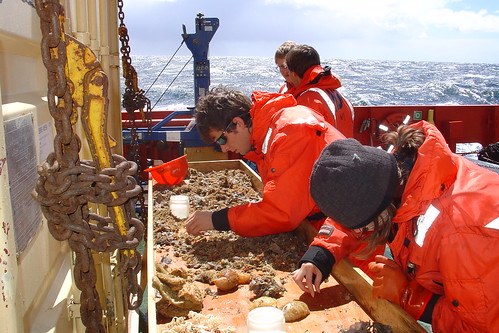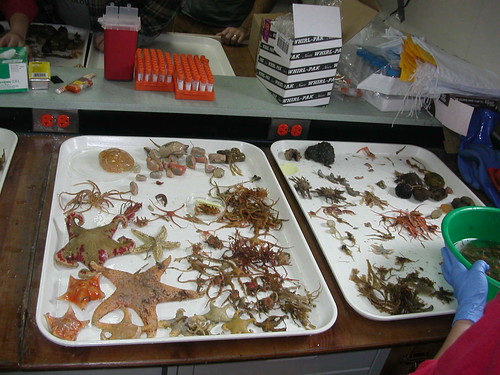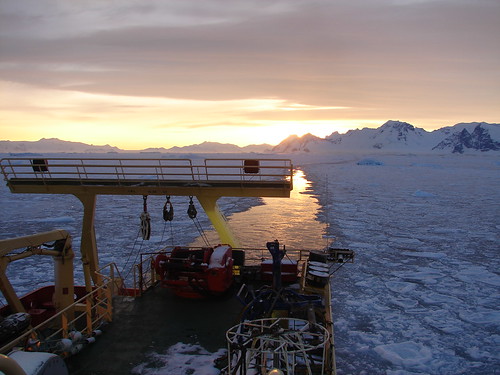COSAM News Articles 2012 December Auburn University Scientists to embark on six-week Antarctic cruise
Auburn University Scientists to embark on six-week Antarctic cruise
On Jan. 1, a team of scientists from Auburn University's College of Sciences and Mathematics will embark on a research cruise to one of the world's most secluded and mysterious places, Antarctica. The voyage will last approximately six weeks, during which time the team will explore the genetic diversity of marine organisms found in the waters surrounding Earth's southernmost continent.
The research is sponsored by a National Science Foundation grant titled, "Genetic Connectivity and Biogeographic Patterns of Antarctic Bethnic Invertebrates." Kenneth Halanych, Stewart W. Schneller endowed chair in Auburn's Department of Biological Sciences, is the principal investigator on the project. Scott Santos, associate professor of biological sciences at Auburn, and Andrew Mahon, assistant professor of biological sciences at Central Michigan University and former postdoctoral fellow at Auburn, are co-principal investigators. Santos will remain at Auburn and collect data and daily journal information from the expedition. The daily blog will be available to follow on the Antarctica Cruises website at www.auburn.edu/antarctica.
Participants on the cruise from Auburn University will include graduate students, one undergraduate student and Halanych, who made a previous research voyage to Antarctica in 1999.
"One of the big challenges of going to the Antarctic is preparing for the trip. You are out in the middle of nowhere, quite literally. You are thousands of miles away from anything. You are on a boat, and everything you need must be taken on that vessel. This includes everything from food, water, personal items and, of course, all the research supplies," Halanych said. "The planning process has gone on now for seven or eight months."
The cruise will begin in Punta Arenas, Chile, and the team will sail around Antarctica, through the Bellingshausen Sea, the Amundsen Sea and the Ross Sea, before disembarking at McMurdo Station, a U.S. research center located at the southern tip of Ross Island.
During the cruise, sample species such as sea urchins, sea spiders, isopods, crinoids and marine worms, will be taken from a depth of 400 to 1,000 meters. The team will document their findings and challenge the theory that many Antarctic species are circumpolar, or found all the way around the continent.
"From some of our earlier work, it seems that some species are circumpolar and others are not. This area of the world has gone through many glaciation cycles, and as the glaciers expand and contract, those cycles change the amount of habitat for the organisms. That can do things to populations such as split them up into smaller fragments, or maintain them in large fragments. The process of this shrinking and expansion, over and over again, can take what looks like one species morphologically and actually give you multiple different genetic lineages," Halanych explained.
Halanych and Santos are co-directors of Auburn University's Molette Biology Laboratory for Environmental and Climate Change Studies, so part of the research focus will pertain to documenting species biodiversity and location as a means of measuring the effects of global climate change.
"We know that as the water is warming up, and as things like ocean acidification happen, organisms are changing where they live, and they are changing their ranges. One of our goals is to document some of the biodiversity and where the animals are before their ranges start shifting," Halanych said.
Undergraduate student Alex Medved, marine biology, is excited about the prospect of collecting samples for research.
"Ken is the reason I decided to come to Auburn University, and throughout my undergraduate career, he has encouraged me to be proactive and get hands-on experience through research. When the opportunity to go on the cruise was presented in August, it was a real curve ball to my senior year and yet, it feels like I have been working toward this trip for years," Medved said. "I will use the Christmas break to study more about the environment and the species we will be collecting. This just seems like the greatest adventure of all time."
The cruise represents a collaborative and international effort as the team includes scientists from several other institutions, including Central Michigan University, British Antarctic Survey, Alfred Wegener Institute, the British Museum and Long Island University. Additionally, biology professors Jim McClintock and Chuck Amsler from the University of Alabama at Birmingham will conduct separate research on the same cruise, allowing the two teams to share samples and data, thus providing more efficiency and a bigger picture of the research.
For more information, visit the website at www.auburn.edu/antarctica.
*Photos were taken on previous cruises.
Latest Headlines
-
07/09/2024
-
Summer Bridge Program celebrates 21 incoming Auburn students as they prepare for future STEM careers07/02/2024
-
07/02/2024
-
06/17/2024
-
06/07/2024



